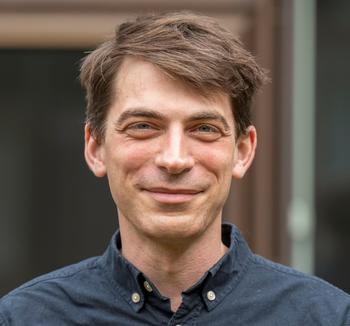ERC Consolidator Grant für Prof. Dr. Malte Rosemeyer
Professor Malte Rosemeyer's project “Experimental Replication of Historical Reanalysis Processes” received an ERC Consolidator Grant. Image Credit: Bernd Wannenmacher
European Research Council to provide nearly two million euros in funding for linguistics researcher at Freie Universität Berlin
Nr. 278/2023 vom 23.11.2023
Malte Rosemeyer, a linguistics professor at Freie Universität Berlin, will receive an ERC Consolidator Grant to fund a new five-year research project titled “Experimental Replication of Historical Reanalysis Processes” (EXREAN). Rosemeyer has been awarded 1.98 million euros of funding for the project. The project aims to investigate processes of language change in French, Spanish, and Italian.
How did verbs such as “to go,” which were originally reserved for describing specific actions, come to take on the more abstract grammatical role of signifying the future (for example, “voy a cantar” in Spanish, or“I am going to sing” in English)? And why did this happen not just once, but across multiple languages? Why did this change in meaning occur in many Romance languages, but not in German? And how can complex cognitive and social processes that took places hundreds of years ago, such as changes in what a word can be used to express, be researched in a meaningful way?
In historical linguistics, reanalysis is described as a process by which speakers assign a new meaning to a superficially unchanged element. Reanalysis presents several methodological difficulties for researchers in the field of historical linguistics. For example, evidence of language change is often determined by comparing language use over time across different historical texts. Reanalysis, however, is a cognitive process and its existence is thus very difficult to prove using written texts. Analyzing language usage in historical texts can only provide limited information about the conditions under which reanalysis takes place.
The EXREAN project is the first of its kind to systematically examine reanalysis and actualization processes in a laboratory setting. It brings together and integrates insights from historical linguistics, psycholinguistics, and social psychology. Specifically, Rosemeyer and his team want to demonstrate the necessity of defining reanalysis as both a cognitive and a social process. The researchers will be investigating whether certain linguistic contexts are necessary for reanalysis to occur and the extent to which social familiarity between the speakers encourages reanalysis. “The results of the project will also enable us to draw conclusions as to why individual grammars developed differently,” says Rosemeyer. In doing so, EXREAN will contribute toward establishing a new historical linguistics that understands itself as a predictive science.
Rosemeyer has been a professor for Romance languages and literatures/Spanish linguistics at Freie Universität Berlin since 2021. He completed his doctoral studies in 2013 at the University of Freiburg with the dissertation “Auxiliary Selection in Spanish: Gradience, Gradualness, and Conservation” and completed his university professorial teaching qualification (Habilitation) in 2020 with the thesis “Variation and Change in Ibero-Romance wh-interrogatives.” His main research interests include investigating grammatical variation and language change in present-day and historical varieties of Romance languages (in particular Spanish, Portuguese, and French) through the use of concepts from the fields of usage-based linguistics and interactional linguistics. Rosemeyer studied Romance languages and literatures, English studies, and history in Cologne and Seville. He has also completed research stays in Leuven, Barcelona, Madrid, Antwerp, and Rio de Janeiro.
